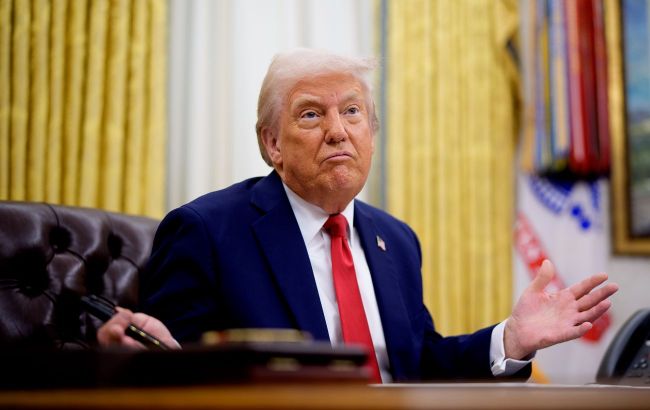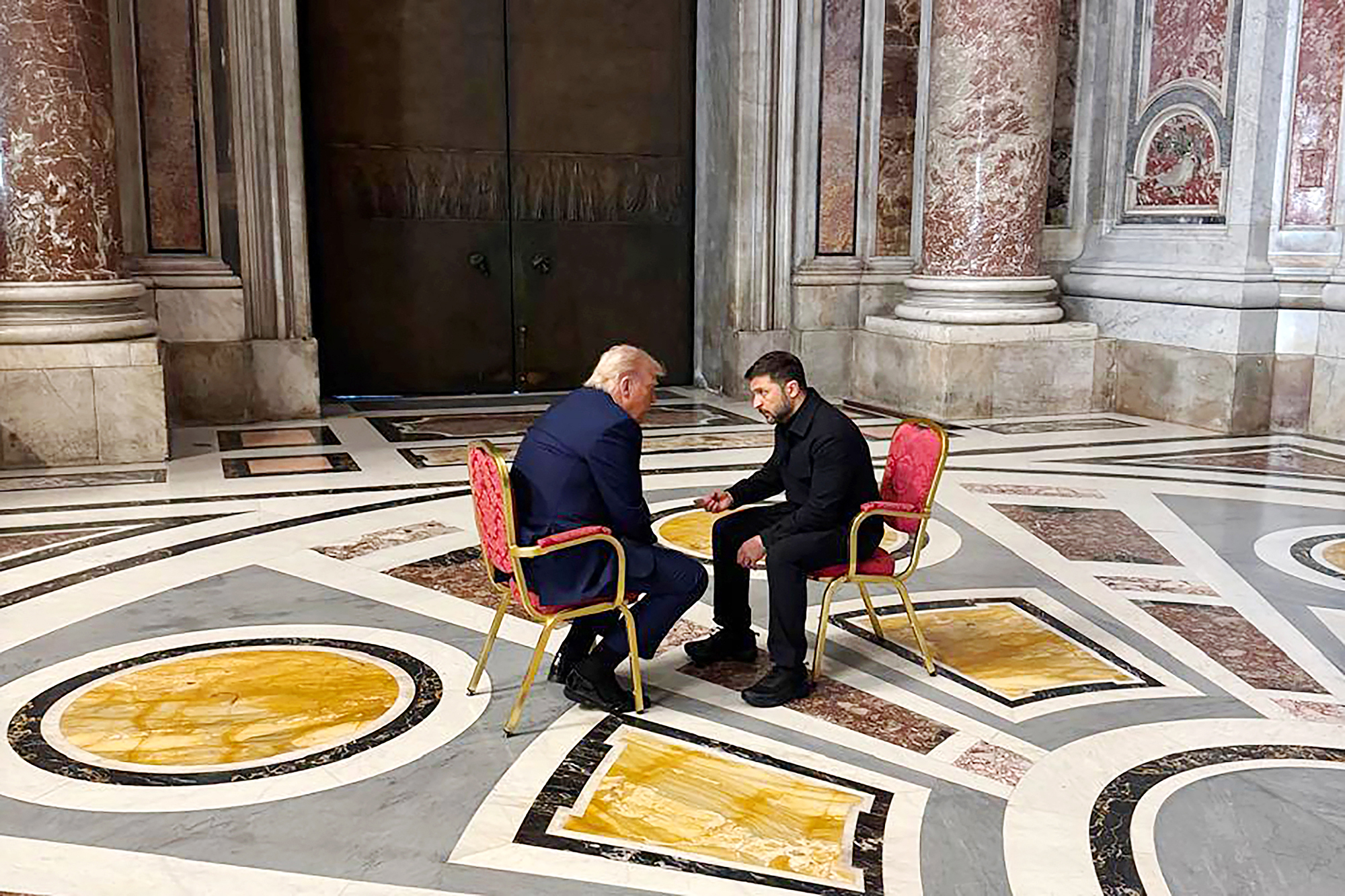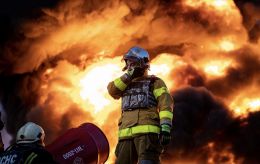Will there be peace? Trump, Zelenskyy, and Putin make new statements
 Photo: US President Donald Trump (Getty Images)
Photo: US President Donald Trump (Getty Images)
The US, Ukraine, and Russia are increasingly discussing possible ways to end the war. US President Donald Trump has his own peace plan, while the Kremlin is issuing ultimatums, and Kyiv insists on its fundamental positions.
What is really happening and what were the latest statements from Trump, Zelenskyy, and Putin – RBC-Ukraine has compiled the details in the material below.
Takeaways
-
Trump changed his rhetoric regarding Zelenskyy and Putin. What did the US president say after the meeting in the Vatican?
-
What does Trump propose, and which conditions will Ukraine not agree to?
-
What proposals are being put forward by the US, and what are Ukraine's conditions?
-
What ultimatums are still being issued by Moscow?
-
What preceded Putin's announcement of the new ceasefire?
USA
Recently, US President Donald Trump's rhetoric regarding Ukraine and its leader, Volodymyr Zelenskyy, has softened, while his stance toward Russian President Vladimir Putin has become more critical.
This shift became noticeable after a brief meeting between Trump and Zelenskyy last weekend in the Vatican, where the leaders attended the funeral ceremony of Pope Francis. It was the first in-person contact between the leaders of Ukraine and the US since the White House scandal at the end of February. The meeting lasted about 15 minutes, but the White House called it "productive," while Kyiv deemed it "very symbolic."
After the meeting, Trump made statements regarding Ukraine in front of journalists in New Jersey. He expressed disappointment over Russia's ongoing attacks on Ukraine.
"I want him (Russian President Putin - ed.) to stop shooting, sit down, and sign a deal. We have the confines of a deal, I believe, and I want him to sign it and be done with it and just go back to life," Trump stated.
It should be noted that Trump criticized Putin after a massive Russian attack, which resulted in the deaths of more than a dozen people in Kyiv. The US president wrote on his social media, Truth Social, that Putin "had no reason to be shooting missiles into civilian areas, cities and towns, over the last few days."
"This makes me think that maybe he (Putin - ed.) doesn’t want to stop the war, he is just deceiving me, and he must be handled differently, through ‘banking operations’ or ‘secondary sanctions.’ Too many people are dying!," Trump added.
The US president again assured that he could "do a lot" to pressure Russia. When asked if he trusted Putin, he responded, "I’ll let you know in about two weeks."
Commenting on his meeting with Zelenskyy in the Vatican, Trump said that the discussions went well. He emphasized that he believes Zelenskyy is interested in reaching a peace agreement.
"I see (Zelenskyy - ed.) calmer. I think he understands the picture, and I think he wants to make a deal... He told me that he needs more weapons, but he’s been saying that for three years. And we’ll see what happens," Trump noted.
Commenting on relations with Zelenskyy after the White House conflict, he said that there had been a small "dispute."
"It (relations - ed.) was never bad. We had a little dispute because I disagreed with something he said. and the cameras were rolling and that was OK with me," Trump said.
When asked if Zelenskyy was willing to concede Crimea, the US president replied, "I think so."
"We’ll see what happens over the next few days. We’ll probably learn a lot," he added.
Notably, US Secretary of State Marco Rubio believes that this week is "very critical" and will be "decisive" in negotiations toward peace in Ukraine. At the same time, he once again warned that Washington could not constantly mediate in pursuit of a peace deal between Kyiv and Moscow without making significant progress.
According to Rubio, both sides "must make some concessions," but he refrained from going into details about the potential agreement. However, based on the materials in Western media, which have widely spread the points of what the "Trump peace plan" could include, it can be concluded that the US is proposing an immediate ceasefire and the beginning of negotiations. At the same time, Crimea is suggested to be recognized as Russian, and the front is essentially frozen.
Ukraine
Ukraine's stance on peace negotiations remains unchanged. Kyiv insists on a full and comprehensive ceasefire (without any preconditions) before it is willing to discuss anything further. This concept is also part of the peace plan proposed by Ukraine and its European partners, according to Western media reports.
"We are also ready to confirm that after a ceasefire, we are ready to sit down (at the negotiation table) in any format, so there is no deadlock, so Ukraine can (participate) - we are ready in any format," President Zelenskyy stated on April 22.
Last week, Zelenskyy reiterated that Ukraine cannot accept US proposals to recognize Crimea as Russian. On Friday, the President emphasized that the territory is "the property of the Ukrainian people."
He reminded of the 2018 Crimea Declaration, which, among other points, asserts that the US reaffirms Ukraine's sovereignty over territories seized by force and rejects Russia's attempts to annex Crimea.
"Ukraine will not legally recognize any temporarily occupied territories. It seems to me that this is a completely fair position. It is not only legitimate according to the Constitution of Ukraine but also in terms of international law," Zelenskyy said in his remarks to journalists on Friday, April 25.
At the same time, the president acknowledged that Ukraine lacks "enough weapons, not people," to regain control of the peninsula. However, he added that other countries have alternative ways to assist Ukraine in reclaiming Crimea. Among these, he named sanctions against Russia.
Despite this, when commenting on his weekend talks with Trump in the Vatican, Zelenskyy described the meeting with the US leader as "good" and added that they "managed to discuss a lot." This was in the context of their meeting lasting just 15 minutes.
"We hope for results on all the issues that were raised. Protecting the lives of our people. A complete and unconditional ceasefire. A reliable and lasting peace that will safeguard against the repetition of war. A very symbolic meeting that has the potential to become historic if we achieve common results," Zelenskyy wrote.
Ukraine's position on peace negotiations was outlined last week by the Ministry of Foreign Affairs. The ministry stated that Kyiv will never:
-
Recognize any part of its territory as Russian.
-
Agree to any limitations on its armed forces or its defense industry.
-
Accept a veto on its participation in alliances and unions.
Heorhii Tykhyi, the spokesperson for the Ministry of Foreign Affairs, during a briefing, commented on various peace plans circulating in the media. He urged the public to consider Ukraine's official stance rather than reacting emotionally to the media leaks.
"There have been enough messages outlining Ukraine’s position. We ask you not to react emotionally to various leaks in the media. They are, trust me, being handled by, excuse my language, just anyone, and a significant part of these leaks doesn’t reflect reality," Tykhyi noted.
The Ministry of Foreign Affairs explained that much of the ongoing discussions remain private. They view the US threats about "pulling out of negotiations" if "progress" is not made as part of a "communication strategy to accelerate the process."

In the Office of the President of Ukraine, attention is drawn to the fact that Russia is not halting fire on the front lines and continues to attack Ukraine with Shaheds. Therefore, all Russian statements about peace without a ceasefire are described by the Office as pure lies.
Meanwhile, the Center for Countering Disinformation under the National Security and Defense Council of Ukraine predicts an intensification of efforts by Kremlin propagandists aimed at discrediting the peace negotiations for a full ceasefire. The main focus of the enemy will be on promoting the narrative about Ukraine’s supposed "inability to negotiate."
Additionally, the Center for Countering Disinformation forecasts an increase in the enemy's disinformation operations related to the anniversary of the tragedy in Odesa and the celebration in Russia of the 80th anniversary of Victory Day.
Russia
Last week, more frequent statements started coming from the Kremlin suggesting that Russia is allegedly ready for direct negotiations with Ukraine. However, as Kremlin spokesman Dmitry Peskov stated, Kyiv must "legally clear the obstacles" for this to happen. He did not clarify what exactly he meant.
It is likely referring to the lifting of the National Security and Defense Council's (NSDC) ban on negotiations with Putin, which President Zelenskyy introduced back in 2022.
Furthermore, the Kremlin began talking about Russia's readiness to start negotiations with Ukraine "without preconditions." According to Peskov, who spoke on Saturday, April 26, Putin allegedly made this statement during talks with Steve Witkoff. The meeting took place in Moscow on Friday, April 25.
It is notable that Peskov's statement came after it was revealed that President Zelenskyy had a personal meeting with US President Joe Biden in the Vatican.
Today, the Kremlin once again urged Kyiv to "take some action" so that negotiations with Moscow could begin. Russia is allegedly "waiting for a signal from Ukraine," but Peskov again did not explain what exactly that signal would be.
While the Kremlin spokesperson reiterates statements about the readiness for dialogue without "preconditions," the Russian Ministry of Foreign Affairs continues to set its ultimatums for negotiations.
Russian Foreign Minister Sergey Lavrov stated that "the Zaporizhzhia nuclear power plant will not be placed under joint control of the US and Ukraine" and added that Moscow "will not agree to any territorial concessions."
Moreover, the Russian minister claimed that Putin allegedly "supported Trump's proposal for a 30-day ceasefire with Ukraine," but with conditions. Among the demands were stopping arms supplies to Ukraine and ensuring that the Ukrainian Armed Forces would not use this time to reinforce.
Later, Moscow, which publicly tries to present itself as ready for negotiations without preconditions, again showed that it does not step back from its ultimatums, which it has long been imposing on Ukraine.
In an interview with the O Globo, a Brazilian newspaper, Lavrov publicly outlined Russia's conditions for negotiations to end the war against Ukraine. It is noteworthy that these conditions also contradict the proposals from the US, which may indicate serious differences between Moscow and Washington regarding a potential agreement.
According to the Russian Foreign Minister, Russia's conditions are as follows:
-
Kyiv must renounce its NATO membership aspirations and establish a neutral, non-aligned status.
-
Crimea, as well as the so-called DPR, LPR (Donetsk and Luhansk People's Republics), Kherson and Zaporizhzhia regions, must be internationally recognized as Russian.
-
Ukraine must lift the ban on negotiations with Russia.
-
"Demilitarization" and "denazification" of Ukraine.
-
All sanctions against Russia must be lifted, and frozen assets must be returned.
-
Ukraine must repeal laws that limit the use of the Russian language, culture, and church.
-
Russia rejects the US proposal to transfer control of the Zaporizhzhia Nuclear Power Plant to Washington and Kyiv.
Putin's new ceasefire
Today, the Kremlin announced that Russian President Vladimir Putin declared a new ceasefire on the occasion of the 80th anniversary of Victory Day.
This ceasefire is reportedly set to be in effect from 00:00 on May 8 to 00:00 on May 11, lasting three days. Russia has stated that the Ukrainian side "should also follow this example."
In response, Ukrainian Foreign Minister Andrii Sybiha proposed a 30-day ceasefire, noting that if Russia truly desires peace, it must cease fire immediately.
"Why wait until May 8? If a ceasefire can happen now, starting from any date, and last for 30 days — so it is real, not just for a parade. Ukraine is ready to support a long-lasting, reliable, and complete ceasefire. And we constantly offer this — at least for 30 days," the minister wrote.
Meanwhile, the White House, in response to Putin's new ceasefire, stated that Trump is "increasingly frustrated by the leaders of both countries."
According to White House spokesperson Karoline Leavitt, the US president "has made it clear that he wants to see a permanent ceasefire in Ukraine, not temporary pauses in military operations." At the same time, Trump "remains optimistic that he will be able to broker an agreement."
Additionally, Putin had previously announced a ceasefire for one day during Easter. During that Easter ceasefire, the Russian army violated the truce nearly 3,000 times. Meanwhile, President Volodymyr Zelenskyy noted that there were no air raid alerts declared in Ukraine during that period.
Sources: statements from the Presidents of Ukraine and the US, as well as government representatives from both countries, Kremlin declarations, and interviews with Russian Foreign Minister Sergey Lavrov for CBS News and O Globo, as well as materials from Reuters.

